Jermey (Jay) Matthews, founder of STEM Reads Book Club, is a PhD research scientist and professional writer, editor, and book publisher. STEM Reads Book Club is a platform that features and promotes children’s STEM books and related resources for creators (authors, publishers), distributors (retailers), and consumers (educators, parents, librarians, afterschool instructors). Their mission is to advance STEM learning through STEM reading, using imagination and inclusiveness as our guiding principles.
What does “entrepreneurship” mean to you?
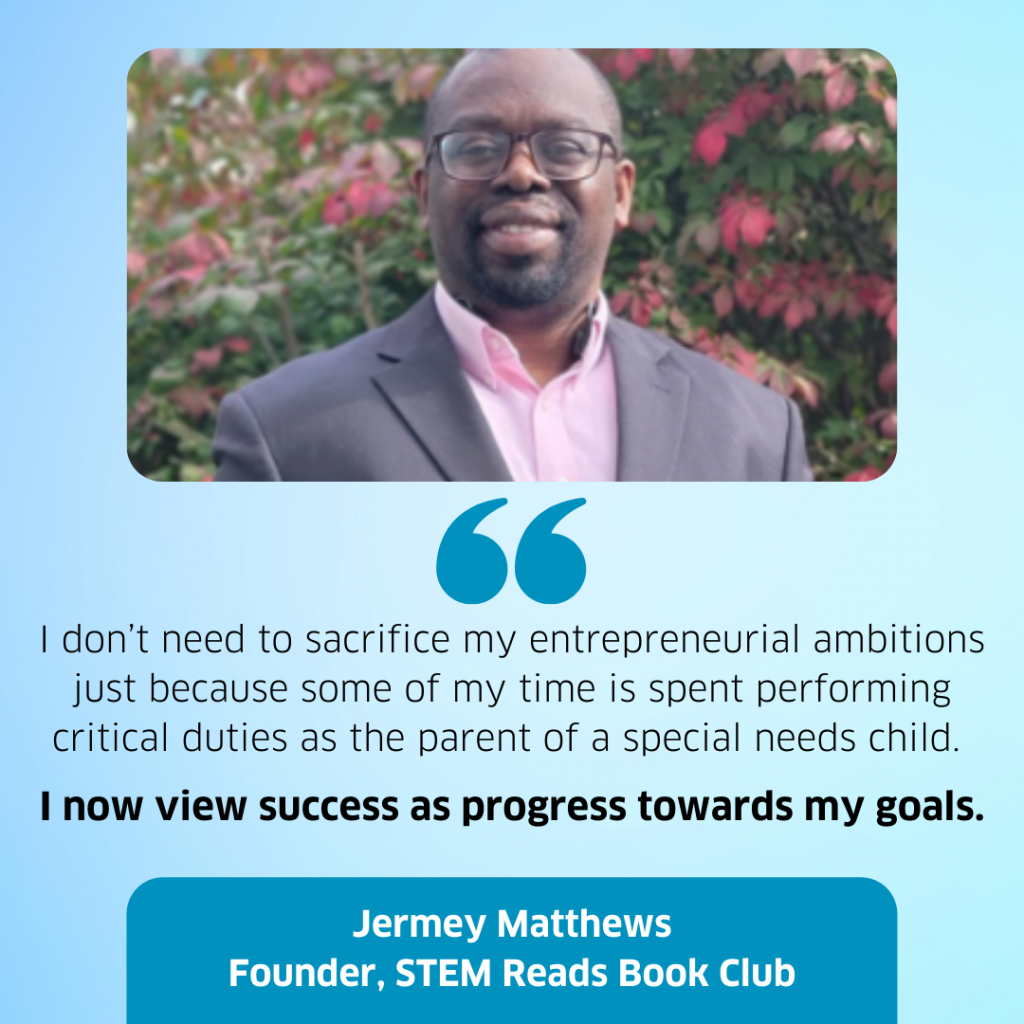 Jermey Matthews: Entrepreneurship means being able to exercise my creative juices without limits in order to bring about change in this world and to build a legacy for my three daughters.
Jermey Matthews: Entrepreneurship means being able to exercise my creative juices without limits in order to bring about change in this world and to build a legacy for my three daughters.
How did your company come to be?
JM: I have two such moments. In 2016, while working as book reviews editor for a leading science magazine, I discovered the monthly subscription box phenomenon and wanted to create a business I could do in my free time. As a scientist and science editor, I was attracted to the various STEM kits for children; I even ordered some for my daughters. However, I noticed that while hands-on STEM kits are fun, the fun stops once the activity is done. I decided to launch a subscription box containing curated children’s STEM books and a few related activities. With kits, you pay a lot for a little, and the fun stops. With books, you pay a little for a lot, and the joy of reading can be repeated. That said, the margins for books are rather thin (even for the producers/publishers; I would know!), so we had to close shop despite grossing $135K revenue in the first 18 months.
The second moment came in the middle of the pandemic in the Fall of 2020. Our 7-year-old daughter, who was too young to remember the subscription box business, requested we (her parents and teen sister) take turns reading to her. Of course, when it was my turn, I read to her from the dozens of STEM books I had ordered for the subscription boxes. I watched her go from having no interest in STEM–she only wanted to be an artist–to developing an intense curiosity for all things STEM, especially architecture and coding. It reminded me of the power of books to spark curiosity and even advance diversity, equity, and inclusion–which is critical for the STEM fields. Now, I am building the STEMReads App, which educators and parents can use to discover and purchase children’s STEM books and also to schedule reading time.
How has your business changed in response to the COVID-19 pandemic?
JM: My business was reborn during the pandemic. Since I am still in the pre-launch phase, it really hasn’t had much of an effect.
What is your proudest and darkest moment so far?
JM: A key high moment was being accepted into an entrepreneurship accelerator at MIT. A key low moment was having a mentor in that accelerator tell me that my business was nothing more than a project. At the time, he was right. I’m a bootstrapping solopreneur and full-time parent. As such, my progress is relatively slow. However, I know that the entrepreneurship race rewards both the swift, and more so, the one who endures.
How is your company changing the landscape?
JM: Most of childhood STEM learning emphasizes hands-on or computer-based activities. But not all families, or school districts, can afford these sometimes expensive kits and gadgets. We think that reading is a much simpler, cost-effective, and inclusive approach and we aim to serve all educators and parents who want to integrate literacy into their STEM learning goals.
What do you wish you knew when you started? Is there anything you would do differently?
JM: I wish I had more courage in my convictions, then I would have launched–and possibly failed, or succeeded–much sooner. I would also have spent less time working on pitch decks and more time working on customer discovery.
What advice/credo do you live by as you grow the business / what is your professional and personal mission statement?
JM: “Find a way to do more for others than anyone else does. Become more valuable. Do more. Give more. Be more. Serve more. And you will have the opportunity to earn more.” Tony Robbins
Where do you find inspiration when faced with challenges?
JM: My wife and children. I literally want to carry them on my back. That brings me joy. Also, my parents. They’ve given me their all, and they actually believe I can do anything. They are the wind beneath my wings.
What does “success” look like for you? What do you think will help you achieve it?
JM: Success means creating something that attracts opportunities for growth, that effectively becomes self-sustaining, and that other people value. For this business, it means establishing partnerships with key stakeholders in formal and informal education and becoming the brand they can trust for STEM reading resources.
Has personal or professional “success” changed for you since the COVID-19 pandemic?
JM: Yes. I realize that I don’t need to sacrifice my entrepreneurial ambitions just because some of my time is spent performing critical duties as the parent of a special needs child. I now view success as progress towards my goals.
What’s it like to work alone or with your partners? What advice do you have for fellow entrepreneurs about building and leading teams?
JM: Currently, my team is me and two low-skilled virtual assistants. My advice would be to do everything yourself first and find a simple way to document your process. Then empower the people on your team to take ownership of their roles and tasks by showing them exactly how they impact the growth of the business.
Many entrepreneurs continue to perfect their daily routines to support their work and greater vision; would you mind sharing your morning routine or a regular ritual that grounds your work each day? How has it changed in recent months?
JM: My mornings are hectic trying to get kids out the door or on the bus. On good days, I wake up at 5 AM, pray, exercise, then prepare tasks for my VAs, who start at 7 AM–the same time I need to go back upstairs and wake up the girls and get them ready for school.
What keeps you motivated during this time?
JM: I’m motivated to prove to myself that I can build something bigger and more impactful than a project.
What kind of an entrepreneur do you want to be known as, as in, what do you want your legacy to be?
JM: I want to build a business that inspires all children–regardless of background, creed, or circumstance–to discover the joy of STEM. I also want to inspire other BIPOC solo, parentpreneurs, especially the ones in unusually challenging home circumstances, to keep going.
What is a quote or some words of wisdom that help get you through the tough days?
JM: “Our deepest fear is not that we are inadequate. Our deepest fear is that we are powerful beyond measure. It is our light, not our darkness that most frightens us. We ask ourselves, ‘Who am I to be brilliant, gorgeous, talented, fabulous?’ Actually, who are you not to be? You are a child of God. Your playing small does not serve the world. There is nothing enlightened about shrinking so that other people won’t feel insecure around you. We are all meant to shine, as children do. We were born to make manifest the glory of God that is within us. It’s not just in some of us; it’s in everyone. And as we let our own light shine, we unconsciously give other people permission to do the same. As we are liberated from our own fear, our presence automatically liberates others.” Marianne Williamson
Have you experienced mentorship in your career? Do you feel it was easily available to you?
JM: I’ve found mentorship difficult to find. Most people care about what’s in it for them. However, I also realize that I haven’t always been ready for mentoring. Now, instead of seeking mentors, I hope by my work and my progress to attract mentors.
Who are the people who have mentored or influenced you in your life or career? How has their influence changed the trajectory of your entrepreneurial journey?
JM: I have not really had business mentors, which is worth noting. My primary mentors have been my science professors and my parents.
Do you have someone you’d like to nominate to be profiled in our Faces of Entrepreneurship series? Please let us know by emailing media@thecenter.nasdaq.org or submit your nomination using this form.
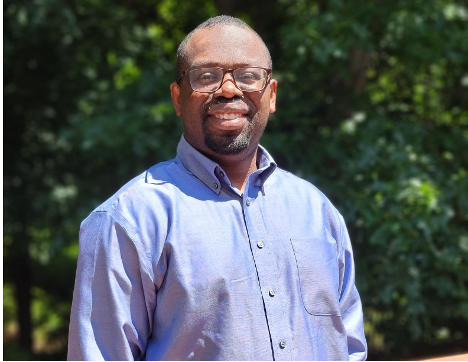
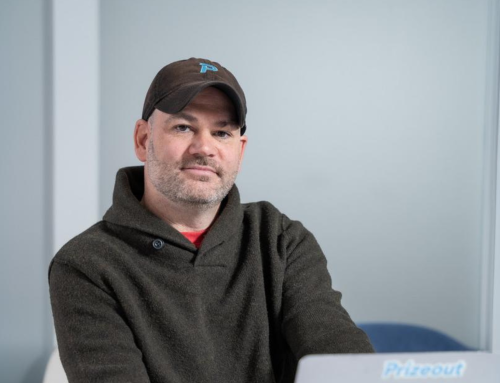
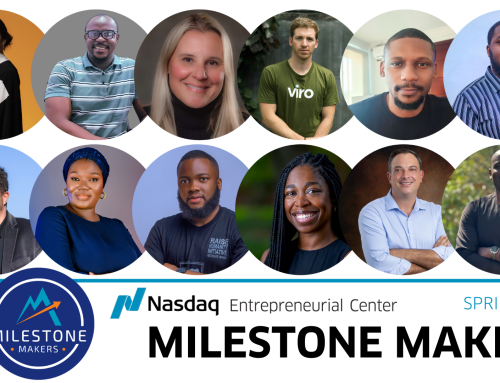
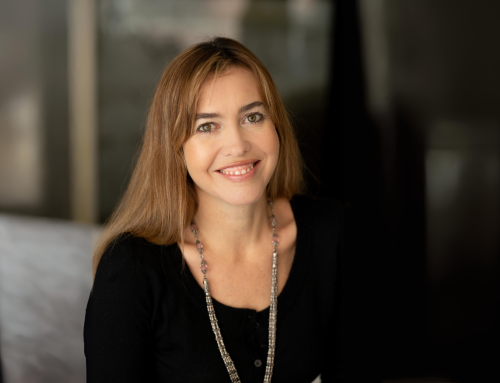
Invite a Friend
Close